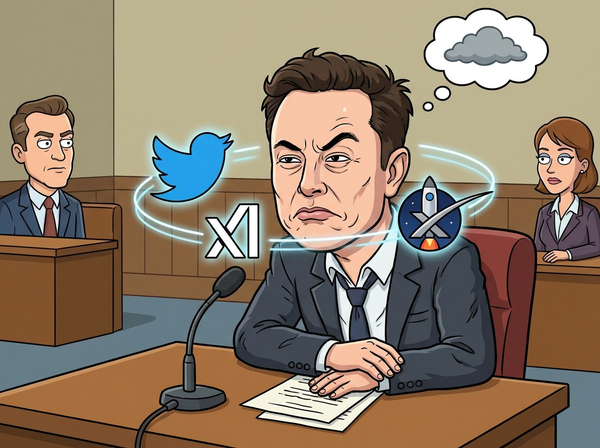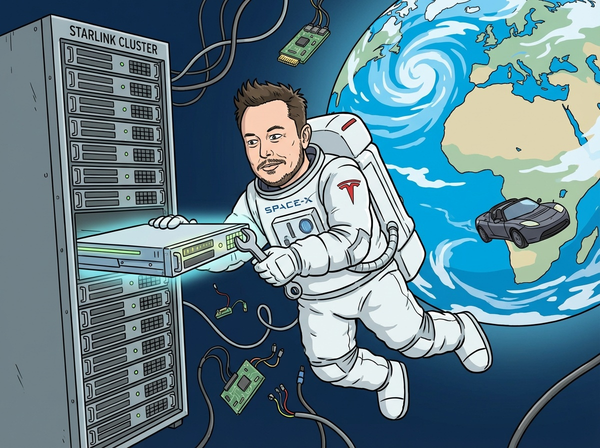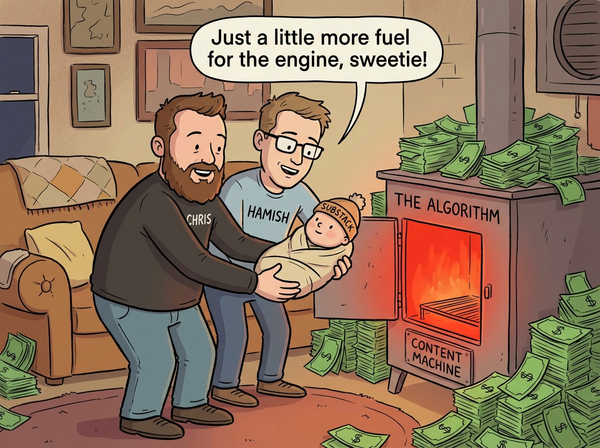What a week, 10/4/25
Too damn much going on this week, but some mixed topics.

I am bummed that my work load lately has been off the charts. It has been curtailing my ability to actually keep up with the insanity, and hoo-boy, is the insanity off the fucking charts.
The pep rally from Hegseth and Trump to the stony audience of military brass in Quantico. The clear disappointment from both Petey-boy and Trump that their performance wasn't met with cheering (I have heard the clips, and it is clear that the staff of both Trump and Hegseth tried to start some cheering, but it failed).
The shutdown started, and Trump and his minions are putting out a ton of AI slop, starting with a racist AI generated video with House Minority leader Jeffries and Senate Minority Leader Schumer:
And it got worse from there.
After that, the shutdown happened, and the Republicans were working overtime to convince the nation that it was the feckless Democrats who caused the shutdown. I mean, the Republicans hold the House, the Senate, and the Presidency, so that tracks.

It looks like the general population is not buying their story, outside of Republicans that is.
On the AI front, OpenAI is realizing that they need to have their own social media site to compete with Grok and Twitter. Their hook is the ability to create short videos with AI that have your likeness as an avatar. But it is a lot worse than that.
Coffeezilla does a great job in his takedown:
The net net is that OpenAI is basically saying "fuck you" to copyright holders, stealing the work of artists, studios and creators. And, get this, as a creator, unless you explicitly opt out, your work(s) are fair game.
What fuckery is that?
Then there is what AI is doing to jobs. Look, I use AI fairly often at work, but it is not a replacement for me and what I do. That said, it is clear that the management and executive class is expecting AI to reduce their labor costs.
There are a lot of arguments that entry level jobs, jobs that people who have just graduated from college would get, are being offloaded to AI. Things like marketing copy writing, basic financial analysis, and the like. This was how people got on the lower rungs of the ladder of a career.
Note: there is some doubt in the data, but it is clear that college educated people early in career are facing a wall of unemployment. Reality might take time to suss out whether this is truly the Generative AI factor, or just cyclicality in business.
But worse than that is something that is becoming clear. A year ago, I got promoted, and I was told that I would get a requisition to replace myself. As my world is going to get even more chaotic, I need that new person. Alas, it was a chore to get the requisition approved. My boss had to build a business case as to why AI couldn't do the job. Ultimately, he got it approved, but the CEO had to sign off (for a product manager position at a Fortune 500 company).
That was 12 weeks ago, and it still hasn't been released.
This gets to a dichotomy in the market. I work in a group that builds training and certifications for IT (Information Technology) fields that provide either a starting point in a career, or a way to advance it. We build training that up skills people to provide lucrative job skills, and we have literally lifted millions of people into roles in networking.
But, the advent of AI is changing the calculus. And instead of Generative AI augmenting people, and helping them rise through their career, it is clear that managers are looking to use it save money. This is what my executives were trying to do with the replacement for my old role, asking do we really need someone who is skilled (read: expensive), or can we just have me to it, and my new job with AI.
Brian Merchant's Substack, Blood in the Machine has a post that is quite good. It is titled: AI is an attack from above on wages:

In it, he is talking to a Cognitive Scientist, and one topic is striking. Instead of Generative AI augmenting a skilled person, the management and executive ranks view it as a way to hire less competent people, to "de-skill" the role:
I think one really crucial thing to keep in mind about these things, it certainly looks like there’s going to be a bubble that a lot of investors are going to lose a lot of money and that it’s going to be bad for workers. But again, that is not really in the realm where we can do something about it, right?
If you’re a worker and AI is coming for your job and it’s giggifying it, the knowledge that it’s a bubble isn’t helping you, right? So that’s one way that I think it’s always important to contextualize that: Well, they’re gambling with our livelihood, but a lot of them are going to lose their money. It’s going to make our lives shittier. But they’re going to keep doing it afterwards, right?
The dot-com bubble only gave rise to the gigantic tech companies that we still live with now. And one of the things that I think is crucial to understand there, and again, to push back against the kind of normal media discourse that happens, is that markets are not a natural phenomenon, right? Markets are always artificial products. And we can see that there’s a lot of market-making going on right now, for example, in the military context. A while back, the US government asked Meta to remove restrictions in their open source licensing of the Llama models that had previously said ‘forbidden military usage’. So that restriction was cut, right? Meta also just got a $1 billion contract from the US government together with Anduril, Palmer Luckey’s company.
So there’s a lot of market-making going on there. And these companies that are investing in these AI things, they’re very, very skilled at figuring out how to produce something that is more like infrastructure. Peter Thiel is always very explicit about this: The way you build a giant company is by creating an artificial monopoly.
Worth the read.
Then, there's the risk of a bubble. A couple weeks ago, an astute reader sent me this post from an investment person. "Global Crossing is Reborn." I read a lot about how it is likely that Generative AI is a bubble, about how much is being spent on infrastructure, and how the economics don't add up. But people like Ed Zitron do the work from the bottom up. In this article it is top down, and it makes a striking analogy.
You probably don't remember this, but a company from the Dotcom era, Global Crossing, laid tons of fibre optics criss-crossing the nation. For a brief time, they and Corning (the glass people who manufactured said fibre) were enormously valuable companies. Alas, Global Crossing is bankrupt, but their legacy of fibre plant is driving the networks of today.[1]
Anyhow, the analog of the frenzy in spending on the foundational AI models is quite well tracking the Global Crossing case study.
A taste:
What’s a datacenter made of?? There are three main components; the building and land at roughly a quarter of the cost, all the power systems, wiring, cooling, racking, etc. at about 40% of the cost, and then the GPUs themselves at about 35% of the cost. I am sure I’m off by a few percent in these categories, but I’m relying on AI and we all know it’s still imperfect. I’m assuming that the building depreciates over 30 years, the chips are obsolete in 3 to 5 years, and then the other stuff lasts about 10 years on average. Call it a 10-year depreciation curve on average for an AI datacenter. Which leads you to the first shocking revelation; the AI datacenters to be built in 2025 will suffer $40 billion of annual depreciation, while generating somewhere between $15 and $20 billion of revenue. The depreciation is literally twice what the revenue is.
Now, here is where it gets complicated as there is no gross margin in the AI game. They’re literally giving away the technology and occasionally getting a nickel back for every dollar they give away. Calculated as a gross margin, it would be -1900%. This is the nature of trying to drive adoption and get customers attached to a product. VC has a long history of funding this sort of thing, as long as the ROIC eventually flips positive. With nothing to go on, I’m going to take an optimistic guess here, and say that ultimately, the margins get to positive, and then gradually creep up towards 25%. Why 25%?? I have no idea. It just sounds right because electricity is really expensive and you need a lot of expensive tech nerds to manage the equipment. Honestly, no one really knows where gross margins eventually land, so let’s just run with it, so that we can do some simple math. The question is, how much revenue do you need to cover the depreciation cost of the datacenter??
The rest of the analysis is easy to follow, and feels rational.
Anyhow, I am up to almost 1,700 words, and I have some work to get to (yeah, being a fancy leader means that I get to log some hours even on the weekends). A lot of AI, but I am in the thick of dealing with it at
Things I wanted to get to, but failed:
- Kash Patel's ridiculous challenge coins
- The insanity of the raid on an apartment building in Chicago
- How will the military respond when Trump and Hegseth direct them to invade cities? (their assertion that Portland, Oregon is worse than Kabul is laughable)
- Will the Democrats fold like a wet tissue in a hurricane on the shutdown? (when MTG correctly states that the Republicans can end the shutdown, your world gets rocked. She's right though)
- I need to write about the Never Trump crowd getting testy that Trump is the natural end state of their New Right/Movement Conservative journey. They are a bit too defensive of their culpability
1 - If you look at where these monster data centers are being constructed, you will notice that they are near rail routes. That is because Global Crossing and L3 communications laid the fibre along rail rights of way.





